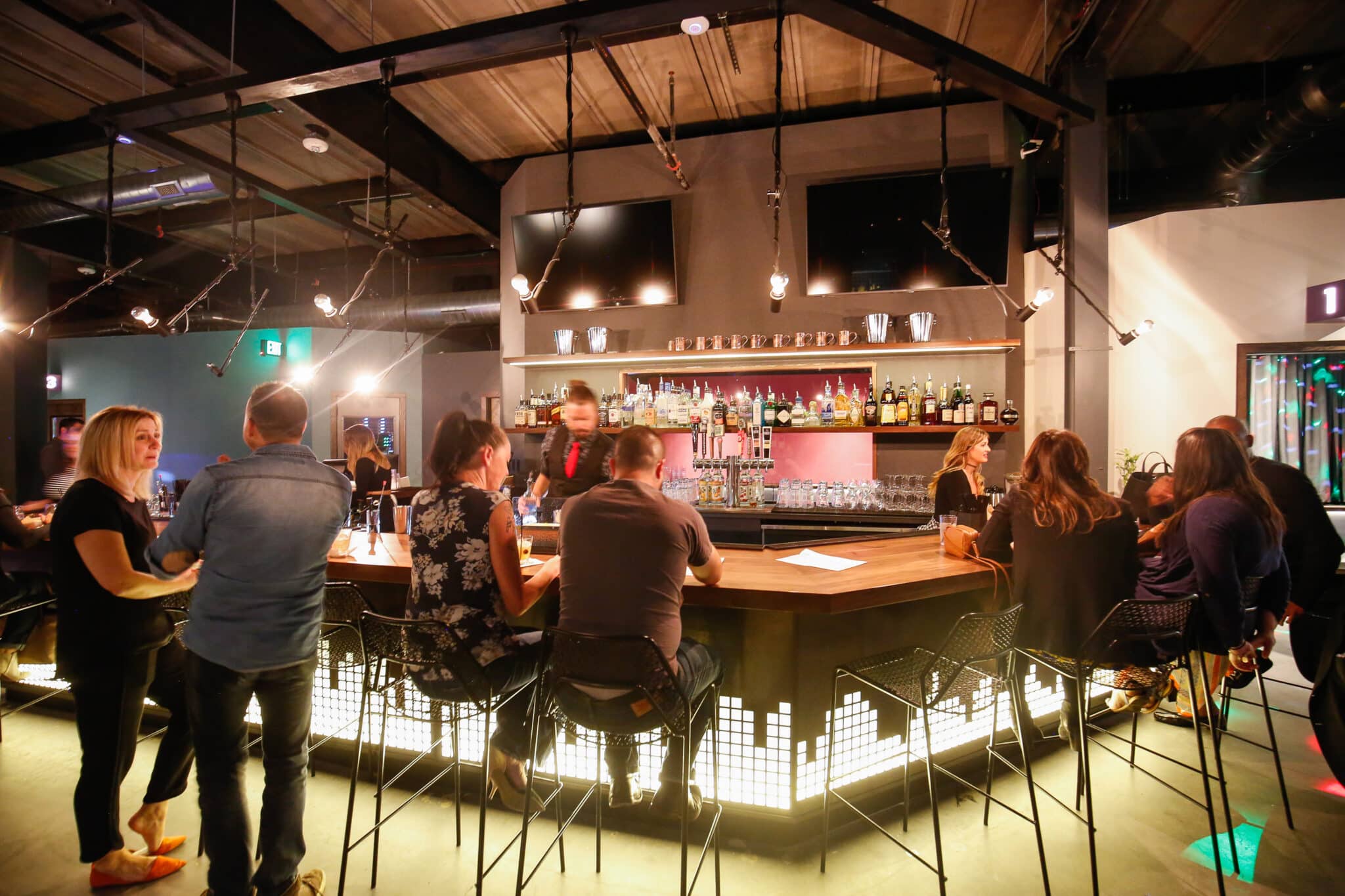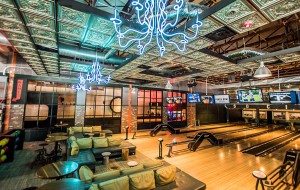
Voicebox Karaoke opened its first location outside of Portland in Denver in 2016. (Courtesy Voicebox Karaoke)
Local developer Ken Wolf says that Denver’s Punch Bowl Social recently bought a karaoke bar that he is a shareholder in without his knowledge and for a suspiciously low price.
Voicebox Karaoke once had locations across four states, including at 2601 Walnut St. in RiNo. But Voicebox left Denver in 2022 and only two locations in Portland, Ore., remain.
Voicebox blamed its landlord, Edens, for pushing it out of RiNo. But Wolf and other investors alleged in a late 2022 lawsuit that the company’s majority owner, Scott Simon, diverted money from the profitable RiNo location to failing karaoke bars in Texas and Idaho, leaving it broke. Wolf’s investment is in Doublesharp Holdings, the parent company of Voicebox.
A six-day trial in the case is scheduled to begin Nov. 18, but the parties have been working in recent months to finalize a settlement instead. During that time, Wolf learned, for the first time, that Punch Bowl bought Voicebox in February.
A copy of the purchase agreement, which BusinessDen acquired from Denver District Court in a records request, suggests that Punch Bowl paid $30,000. Wolf finds that strange.
“Mr. Simon has told me that he believes the two Oregon Voicebox locations are actually worth approximately $1 million,” the developer wrote in a sworn affidavit on Sept. 5.
Wolf said that Punch Bowl also purchased Lyrical Systems, which owns Voicebox’s karaoke music licensing rights, for $15,000. That, too, is far below market value, he said.
“It is my understanding that Punch Bowl Social paid $100,000 per year in licensing fees to Lyrical Systems,” Wolf said in his affidavit, also obtained in a records request.

Punch Bowl Social’s bowling lanes and tables in its Denver location. (Courtesy of Punch Bowl Social)
Furthermore, Wolf claims that Simon told him of a third transaction in which Punch Bowl will pay Simon’s mother $100,000 she had previously loaned to Doublesharp and will pay Simon a $7,500-per-month consulting fee. Wolf does not have documentation of this.
“This sort of undisclosed ‘step transaction’ appears to be an effort to hide the true nature of the transactions and to benefit (Robert) Cornog, Mr. Simon, and others at the expense of Doublesharp,” Wolf wrote, adding that their deal raises “concerns of self-dealing.”
Cornog, a cofounder of Punch Bowl Social, took over as CEO after a bankruptcy in 2021.
Wolf is raising his concerns now because the proposed settlement between himself and Voicebox would prohibit him from suing the company again. Wolf now wonders whether that clause was inserted by Simon and Voicebox “to absolve them from liability” for their allegedly shady sale to Punch Bowl. He wants the clause removed by a Denver judge.
“The (Punch Bowl) transactions were approved by Mr. Simon, appear to personally benefit Mr. Simon and his family, and should have been disclosed,” according to Wolf.
Punch Bowl Social did not answer requests for comment. Neither did Simon’s lawyers, Derek Anderson and Susie Youn with Winget Spadafora & Schwartzberg in Boulder.
When Punch Bowl bought Voicebox in February, along with an immersive art museum in Dallas called Sweet Tooth Hotel, Cornog told industry publications that he planned to operate them as separate brands. Punch Bowl’s restaurants are much larger than Voicebox’s.
“The Punch Bowl brand has always skewed to the restaurant side, the food and beverage,” Cornog said to Restaurant Business Magazine in March. “We now have the opportunity to engage with a different set of guests with more activity-based experiences.”

Voicebox Karaoke opened its first location outside of Portland in Denver in 2016. (Courtesy Voicebox Karaoke)
Local developer Ken Wolf says that Denver’s Punch Bowl Social recently bought a karaoke bar that he is a shareholder in without his knowledge and for a suspiciously low price.
Voicebox Karaoke once had locations across four states, including at 2601 Walnut St. in RiNo. But Voicebox left Denver in 2022 and only two locations in Portland, Ore., remain.
Voicebox blamed its landlord, Edens, for pushing it out of RiNo. But Wolf and other investors alleged in a late 2022 lawsuit that the company’s majority owner, Scott Simon, diverted money from the profitable RiNo location to failing karaoke bars in Texas and Idaho, leaving it broke. Wolf’s investment is in Doublesharp Holdings, the parent company of Voicebox.
A six-day trial in the case is scheduled to begin Nov. 18, but the parties have been working in recent months to finalize a settlement instead. During that time, Wolf learned, for the first time, that Punch Bowl bought Voicebox in February.
A copy of the purchase agreement, which BusinessDen acquired from Denver District Court in a records request, suggests that Punch Bowl paid $30,000. Wolf finds that strange.
“Mr. Simon has told me that he believes the two Oregon Voicebox locations are actually worth approximately $1 million,” the developer wrote in a sworn affidavit on Sept. 5.
Wolf said that Punch Bowl also purchased Lyrical Systems, which owns Voicebox’s karaoke music licensing rights, for $15,000. That, too, is far below market value, he said.
“It is my understanding that Punch Bowl Social paid $100,000 per year in licensing fees to Lyrical Systems,” Wolf said in his affidavit, also obtained in a records request.

Punch Bowl Social’s bowling lanes and tables in its Denver location. (Courtesy of Punch Bowl Social)
Furthermore, Wolf claims that Simon told him of a third transaction in which Punch Bowl will pay Simon’s mother $100,000 she had previously loaned to Doublesharp and will pay Simon a $7,500-per-month consulting fee. Wolf does not have documentation of this.
“This sort of undisclosed ‘step transaction’ appears to be an effort to hide the true nature of the transactions and to benefit (Robert) Cornog, Mr. Simon, and others at the expense of Doublesharp,” Wolf wrote, adding that their deal raises “concerns of self-dealing.”
Cornog, a cofounder of Punch Bowl Social, took over as CEO after a bankruptcy in 2021.
Wolf is raising his concerns now because the proposed settlement between himself and Voicebox would prohibit him from suing the company again. Wolf now wonders whether that clause was inserted by Simon and Voicebox “to absolve them from liability” for their allegedly shady sale to Punch Bowl. He wants the clause removed by a Denver judge.
“The (Punch Bowl) transactions were approved by Mr. Simon, appear to personally benefit Mr. Simon and his family, and should have been disclosed,” according to Wolf.
Punch Bowl Social did not answer requests for comment. Neither did Simon’s lawyers, Derek Anderson and Susie Youn with Winget Spadafora & Schwartzberg in Boulder.
When Punch Bowl bought Voicebox in February, along with an immersive art museum in Dallas called Sweet Tooth Hotel, Cornog told industry publications that he planned to operate them as separate brands. Punch Bowl’s restaurants are much larger than Voicebox’s.
“The Punch Bowl brand has always skewed to the restaurant side, the food and beverage,” Cornog said to Restaurant Business Magazine in March. “We now have the opportunity to engage with a different set of guests with more activity-based experiences.”
